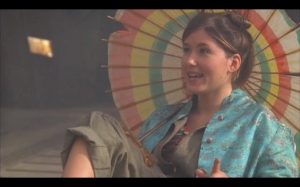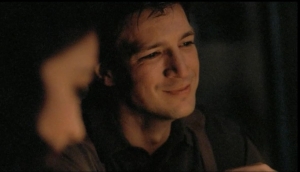The idea sounds terrible. A Western, set in outer space on a space ship 5,000 years in the future. Look a little closer, and those assumptions could be confirmed: cancelled without warning after a meagre thirteen episodes on air. Must have been a horrible experiment gone terribly wrong, and the guy at the network who signed it probably got fired.
Wrong.
Cancelled after being unfairly aired out of order, and with next-to-no publicity campaign, Firefly is quite possibly the best piece of television made in the last thirty years.
Fans of the show already know this, but if you’re a Firefly virgin, I’m almost jealous of the experience you have ahead of you. If you’re in North America (or live elsewhere and have a proxy-server… ahem, excuse me, I mean I have no idea what that might be), go to Hulu Plus, Netflix, whatever you’re signed up for. They have all the episodes, including the three that never aired. Start with the first one. But make sure you start early in the evening, or you might not get any sleep tonight. You’re not going to want to stop watching.
What makes it so good? I’ve asked myself that millions of times. Since Firefly has become the one to which I compare all other television shows (no matter the genre), I’ve had to come up with some reasons. Here’s how I see it:
- It’s pretty. Episode after episode, Firefly is a feast for your eyes, from the landscapes to the sets to the costume design. In the future in outer space, all human cultures have collided, and it’s a gorgeous thing to see.
- It’s cool. I mean, they swear in Chinese. (I speak Mandarin, and the comprehensibility of each actor’s attempt at the language varies greatly, but no matter what it still sounds awesome.) They also ride horses and go to balls and pull off some very nice heists. You’re having fun watching it, and the people making it were clearly having a great time, too.
- It’s smart. The writing is excellent. They expect the viewers to possess intelligence, and they don’t dumb down the show for you. They make you think– not in the moralising way that Star Trek does (though I do enjoy the occasional Next Generation episode), but in an interesting way that stays with you for a long time. You can watch the same episode over and over and always come away with something new. It’s like a good book that way.
- But, most of all, and this is the most important: It has HEART. That’s become my ultimate standard for a television show. What do I mean by “heart?” In order for a show to have heart, the following questions must be answered with a (resounding) yes:
Do the characters in the show care about each other? And I mean, do all the individuals care about everyone else in the group? (This might be what Joss Whedon calls the ‘family’ effect– more on that in another post!)
Do I care about the characters? Am I going to be upset if one of them is hurt or killed?
Do I feel what they feel when I see them feel it? Has the show elicited my empathy?
Am I invested in their future?
If you answer “yes” to these questions, then I call it A Show With Heart. Firefly set that standard; it’s a lot to live up to.
Of course, a lot of other things matter, too, like whether or not the cast can act. But I guarantee if the cast can’t act, or if the directing sucks, or any of those standard measures for the worth of a show show problems, then the show won’t have Heart. It just won’t pull it off. But the cast of Firefly is amazing! Did I mention it stars Nathan Fillion?
“BUT,” you say, “SCI-FI?? Really? I hate all those shows about not-real things, with aliens and stuff I can’t relate to.” First of all, no aliens in Firefly! Nope, in the Firefly universe, we never did find any other form of intelligent life anywhere else in the galaxy. So you’re safe on that front. But Firefly isn’t your typical Sci-Fi show in a lot of other ways, too. The reason why most Sci-Fi haters (rightfully) hate Sci-Fi shows, is that there is a trap that these shows often fall into of becoming overly absorbed in the technology, futuristic coolness of it all, and they forget the humanity. I can assure you, most of the time Firefly doesn’t feel like it’s set in the future– the ship Serenity can sometimes be more reminiscent of Das Boot than of the Enterprise or anything you saw in Stargate (a show I’ve never watched). But Firefly is all about humanity: these are human stories and human questions (and sometimes very funny human foibles) that surpass time and space so that the setting ultimately matters little, and the journey matters the most.
I won’t get into my specific thoughts and analysis on all the wonderful things that Firefly has to offer in this post. I can probably write more posts about this, the shortest running of shows, than about The X-Files, also a favourite, a show that ran for nine years. But I will leave my already enlightened readers with one parting fact to enjoy:
‘Objects in Space’ was originally filmed after ‘Heart of Gold’, which never aired. In the current versions on the DVDs, Netflix, and Hulu Plus, the episode runs as it was originally filmed. However, when it aired the first time, an alternate conversation had to be filmed between Mal and Inara (Morena Baccarin), because the earth-shattering ending of ‘Heart of Gold’ had never yet been seen. So if you have never seen the DVDs, look for the scene in the ‘Deleted Scenes’ section of the Special Features on disc 4.
Steer clear of Alliance cruisers, keep a low profile when Reavers are about, and enjoy finding a family at the edge of the galaxy! You will never regret your choice to fly with the crew of this particular Firefly class transport and her taciturn captain Malcolm Reynolds.

